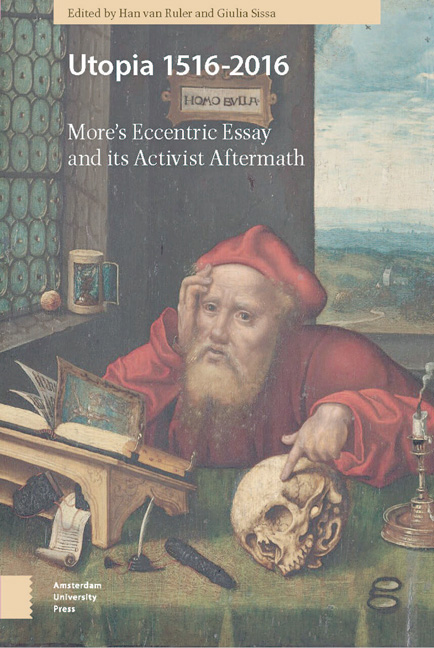Book contents
- Frontmatter
- Contents
- Introduction
- PART 1 THE BOOK
- A Praise of Pain: Thomas More’s Anti-utopianism
- Bodies, morals, and religion: Utopia and the Erasmian idea of Human Progress
- PART 2 ORIGINAL RECEPTION
- Realism Vs Utopianism: The Problem of the Prince in the Early-Modern Netherlands
- From Thomas More to Thomas Smith: Utopian and Anti-Utopian Understandings of Economic Change in Sixteenth-century England
- PART 3 PHILOSOPHICAL CRITICISM
- Reflections on the Utopian Mind
- Utopianism in Today’s Health Care
- PART 4 PHILOSOPHICAL ACCLAIM
- Utopianism and its Discontents: A Conceptual History
- The integrity of Exacerbated Ambiguity: More’s Utopia as an Evaluative Thought Experiment
- Index
From Thomas More to Thomas Smith: Utopian and Anti-Utopian Understandings of Economic Change in Sixteenth-century England
Published online by Cambridge University Press: 12 December 2020
- Frontmatter
- Contents
- Introduction
- PART 1 THE BOOK
- A Praise of Pain: Thomas More’s Anti-utopianism
- Bodies, morals, and religion: Utopia and the Erasmian idea of Human Progress
- PART 2 ORIGINAL RECEPTION
- Realism Vs Utopianism: The Problem of the Prince in the Early-Modern Netherlands
- From Thomas More to Thomas Smith: Utopian and Anti-Utopian Understandings of Economic Change in Sixteenth-century England
- PART 3 PHILOSOPHICAL CRITICISM
- Reflections on the Utopian Mind
- Utopianism in Today’s Health Care
- PART 4 PHILOSOPHICAL ACCLAIM
- Utopianism and its Discontents: A Conceptual History
- The integrity of Exacerbated Ambiguity: More’s Utopia as an Evaluative Thought Experiment
- Index
Summary
Abstract
The emergence of the political sphere as an autonomous domain of human activity is considered to be one of the great achievements of Renaissance philosophy. The complementary autonomy of the economic sphere, however, was also shaping up in the world of philosophical ideas. In this article, I examine how the late medieval notion of moral economy was transformed in the hands of two illustrious representatives of Tudor and Elizabethan political thinking, Thomas More (1478-1535) and Thomas Smith (1513-1577). More specifically, I will show how, at a time of intense economic and social unrest, Smith's A Discourse of the Commonweal of This Realm of England (1549) and De Republica Anglorum: A Discourse on the Commonwealth of England (written between 1562 and 1565) recast Morean utopian themes in a distinctively antiutopian light.
Keywords: appetite, life and death, fear, want, hunger, cunning, economic change, political imagination, health
Introduction
Thus, so that one greedy, insatiable glutton (helluo), a frightful plague to his native country, may enclose thousands acres within a single fence, the tenants are ejected; and some are stripped of their belongings by trickery (fraus) or brute force (vis), or, wearied by constant harassment (iniuriae), are driven to sell them. One way or another, these wretched people – men, women, husbands, wives, orphans, widows, parents with little children and entire families (poor but numerous, since farming requires many hands) – are forced to move out. They leave the only homes familiar to them, and can find no place to go. Since they must leave at once without waiting for a proper buyer, they sell for a pittance all their household goods, which would not bring much in any case. When that little money is gone (and it's soon spent in wandering from place to place), what finally remains for them but to steal, and so be hanged (ut furentur et pendeant) – justly, no doubt – or to wander and beg (aut vagentur atque mendicent)? And yet if they go tramping, they are jailed as idle vagrants. They would be glad to work, but they can find no one who will hire them. There is no need for farm labour, in which they have been trained, when there is no land left to be planted (ubi nihil seritur).
- Type
- Chapter
- Information
- Utopia 1516-2016More's Eccentric Essay and its Activist Aftermath, pp. 143 - 168Publisher: Amsterdam University PressPrint publication year: 2017



